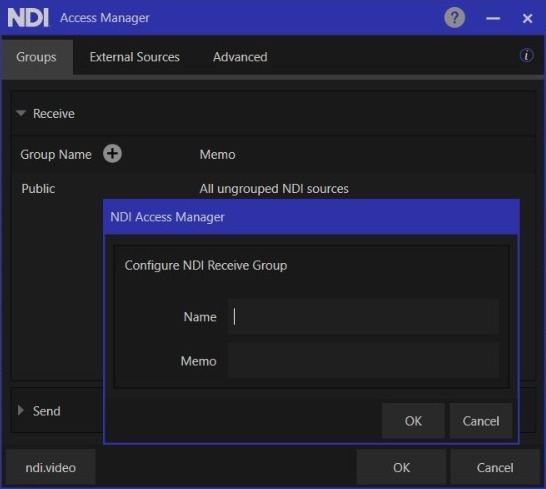Access Manager
Streamline NDI Source Management.
NDI Access Manager is a tool designed to give you control over the visibility and discoverability of NDI sources within your network. This tool allows you to manage precisely who can see specific NDI sources through the utilization of send and receive groups.
Download NDI Tools here.
Accessing NDI Access Manager
Install NDI Tools and run NDI Access Manager from the NDI launcher or your applications list.
Creating Groups
In the "Groups" tab, create different NDI groups (by clicking the plus sign icon) to determine which devices can send or receive specific NDI signals.
Example Scenario:
In this screenshot, the group "Public" can both receive and send, meaning any device can see the output NDI signals of this computer, and it can also see any other device in the same group "Public".

To configure a group, you should attribute it to a name. You can also add a small memo/note with additional information about the group.
By entering group names, you restrict NDI sources to only those devices that have the corresponding Group in their Receive Groups list.
Configuring Devices
If you want to explore some examples of how to connect different devices to NDI Groups, check the scenarios in our White Paper.
External Sources
Use the External Sources tab to reach NDI-enabled devices on subnets that are not on your current network.
Add external sources by specifying IP addresses, providing easily identifiable names, and managing settings.
Advanced Settings
Explore advanced settings in the "Advanced" tab to address specific network challenges:
Configure transport modes, multicast ranges, network mapping, and more.
To streamline the management of NDI signals, particularly in larger networks, designate an NDI discovery server, set preferred NICs, and define device aliases.

NDI Access Manager settings are saved into a specific file in the computer's operating system. All NDI applications will look for this file when they first start to get the NDI configuration data. If this file is updated while an NDI application is running, it will continue to use the previous information. To refresh the settings for an NDI application, restart it again which will make it read the file and get the new settings.
The NDI Access Manager configuration file is stored in the following location:
%programdata%/NDI/ndi-config.v1.json
Always ensure network configurations align with IT guidelines for better network compatibility and optimal performance. Consult with your IT department before configuring NDI Access Manager.
Last updated
Was this helpful?

